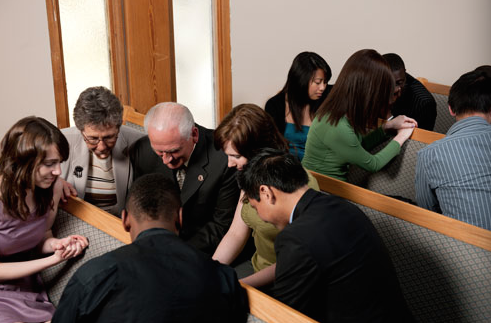What matters to your church?
Taking time out to reflect on why we do what we do as a church can be a challenging prospect. John Rackley considers three questions that might help us start the journey
A church has just called a new minister and together they are looking at how they can develop their involvement in the neighbourhood...
A church is finding that they are struggling with maintaining their present programme of activities and realise they need to cut back...
A church has struggled on with ideas they know are no longer meeting the needs of the Gospel....
It is time to do some tough thinking and strong praying. So what next?

It is not always easy for churches to start questioning their life together. Often what is happening is important and might have strong support.
The decision of whether or not to review what has been going on is sometimes painful. On the other hand, sometimes it has all become a bit of a strain. Volunteers are scarce, so are results and confidence is draining away. The approaching crisis must be accepted as an opportunity.
When such experiences are faced with honesty and courage God will start a ‘new thing’ through his people and the coming Kingdom will be glimpsed.
A few years ago I had to speak at a united service in Nailsea, Somerset. I didn’t know any of the churches and we would be worshipping in a Roman Catholic Church building. I wanted to talk about the shared mission of the churches. I came up with three questions which became the basis of my talk. My scripture was Mark 2:1-12 (Jesus forgives and heals a paralysed man). These verses are about motivation and priority.
So imagine yourself going into your church on a Sunday morning for the first time. You might look at the notice boards or respond to whoever speaks to you first. Unconsciously you are asking the first question...
What matters here?
It may well be on the mind of a newcomer and it should have a similar priority for the congregation. It’s a tough question because it is about what we really think is important and how we come across.
It goes beyond simply making a list of what happens but requires that we ask why we do what we do. For instance:
What is it that takes up much of the time at a church meeting?
What is the issue that the deacons’ meeting regularly avoids because it will cause conflict?
One way of using this question is to approach people who use the premises but don’t join in worship and ask them what they think your church stands for.
The next question is not as simple as it sounds.
Does God matter here?
Of course God matters to a church! Move on. Well, not so fast. Can we be that sure? I don’t think we should be in such a rush. I wonder whether a common but un-examined reason for reaching out to others is actually no more than a recruitment drive for our organisation. God doesn’t matter so much as keeping our show on the road.
There are three ways God is pushed out of a decision about the mission of a church. This happens when we reduce our mission to wanting:
-
people to join us to help us do what we are already doing
-
people to join us so that we can stand down
-
people to join our church because it will make us look good
In other words, the maintenance of a church is being mistaken for the work of God in the world. In contrast, the shape and life of a church needs always to be a response to the Gospel. So we come to the final question.
Does what matters to God matter here?
The mission of the church begins with the Mission of God. Or putting it another way, God is the initiator, we respond. God loves so that we know we are loved. God was in Christ reconciling the world to him. And so it goes on.
No matter how effective, honoured and well-supported an activity of the church it needs to reflect the nature of God for it to be a partnership with God.
But some may ask: how do we know what matters to God?
Here are a few areas of research:
-
Look at your neighbourhood and consider who Jesus treated as neighbours
-
Study Isaiah 56 onwards as a vision of what a God-focused society might look like
-
Read Micah and Amos, two prophets calling their people back to God-like values
-
Live one year in the life of your church reflecting on what the Bible might say about the issues that regularly affect people’s lifestyles and decide what you can do about them
-
Avoid the temptation to tell God your vision; pray for the faith to see his vision for you
-
God is in all things thus we move from the threshold of the church into the mission of God; its hidden but powerful momentum swirls around the events and experiences of people’s lives.
John Rackley is Baptist minister living Leicestershire. Read more in his blog www.windingquest.wordpress.com
This article appears in the summer 2015 edition of Baptists Together Magazine
Picture: Christopher Futcher
Baptists Together, 25/04/2015